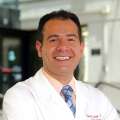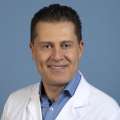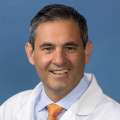Preventative Cardiology & Cardiometabolic Health
Supporting your cardiometabolic health helps you strengthen and maintain a healthy heart.

Why choose UCLA Health for preventive cardiology and cardiometabolic health care?
Heart disease prevention starts by addressing cardiometabolic health risk factors, such as high blood pressure and cholesterol. The UCLA Health Preventive Cardiology and Cardiometabolic Health Program provides personalized, comprehensive care to people who want to decrease their risk of developing or worsening cardiovascular disease. When you choose our program, you can expect:
Award-winning excellence: UCLA Health has been rated "Best in the West" in cardiology and heart surgery by U.S. News & World Report. Many of our physicians are included among Los Angeles Magazine's "Top Doctors" and "Super Doctors" of Southern California.
Highly skilled specialists: Our board-certified doctors have extensive training and experience in preventive cardiology and cardiometabolic health. They are known nationwide as leaders in their fields.
Coordinated care: Our specialists work as a team to provide seamless, complete care. Our team includes experts in preventive cardiology, genetics, gastroenterology, endocrinology and pharmacotherapy. We also work closely with mental health, nutrition and exercise professionals.
Advancing care through research: UCLA Health physician-scientists are among the nation's leaders in discovering new ways to treat cardiometabolic conditions. The Conner Dunn Endowment in Cardiometabolic Health enables our team to galvanize research, education and clinical efforts in cardiometabolic health and cardiovascular disease prevention.
Who can benefit from the Preventive Cardiology and Cardiometabolic Health Program?
How your body changes food into fuel (your metabolism) directly impacts how well your cardiovascular system works. Cardiometabolic health is measured by several factors, including:
- Blood pressure
- Blood sugar
- High-density lipoprotein (HDL) cholesterol
- Triglycerides
- Weight and waist circumference
We help people who want to understand their cardiometabolic health and risk of a future cardiovascular problem. People who come to our program typically have:
- A history of cardiovascular disease and want to prevent a recurrence
- A family history of heart disease or high cholesterol
- Cardiometabolic risk factors (high levels of blood sugar, triglycerides, HDL cholesterol and blood pressure and excess fat around the waist)
- No heart disease history or cardiometabolic risk factors and want to maintain their heart health
Conditions we treat
We care for people who want to prevent or treat all types of cardiovascular disease, including:
- Atherosclerosis: Plaque builds up in the vessels that transport oxygen- and nutrient-rich blood to the body. The hardened, narrowed arteries slow or block blood flow, leading to various cardiovascular disorders.
- Coronary artery disease (CAD): Blockages in your coronary arteries can reduce blood flow to the heart. A lack of oxygen to the heart muscle can cause chest pain, shortness of breath or a heart attack.
- Heart attack (myocardial infarction): Reduced or stopped blood flow to the heart causes the heart muscle to die.
- Heart failure: Your heart is too weak or stiff to pump enough blood to meet your body's needs.
- Peripheral artery disease (PAD): Atherosclerosis in the arms and legs can cause pain during movement (claudication), numbness, weakness and coldness in the limbs.
- Stroke: A lack of blood flow to the brain deprives brain tissue of oxygen and nutrients, causing brain cells to die.
We aim to reduce your chance of developing or worsening heart disease by helping you control its risk factors. Cardiometabolic conditions contributing to heart and vascular disease often occur at the same time and include:
- High blood pressure (hypertension): The force of blood against your artery walls is excessive. This pressure can damage the heart and blood vessels over time.
- High cholesterol or triglyceride levels: Cholesterol and triglycerides are waxy substances in your blood. Excessive amounts can lead to atherosclerosis. High cholesterol can be inherited (run in families) or result from lifestyle habits.
- Inflammation: Certain conditions cause the body to release inflammatory cells. Chronic inflammation can lead to coronary artery disease. Inflammation that impacts heart disease can result from obesity, stress or autoimmune conditions such as lupus and rheumatoid arthritis.
- Overweight and obesity: Excessive body fat accumulation, especially around the waist, can lead to high blood pressure, diabetes and high cholesterol.
- Prediabetes and Type 2 diabetes: Your body doesn't produce enough insulin or doesn’t use it effectively. Insulin is the hormone that transports blood glucose to your cells for fuel. A lack of insulin leads to high blood glucose (blood sugar) levels.
- Steatotic (fatty) liver disease: A buildup of fat in the liver not caused by alcohol is closely linked to and can worsen cardiometabolic conditions, including diabetes and obesity.
Tests and treatments we offer
On your first visit to our program, you meet with one of our doctors to discuss your and your family's medical history. We talk about lifestyle habits that can affect your heart and blood vessels, including diet, exercise habits, stress and smoking. We also complete a comprehensive physical examination.
Your doctor may request tests that measure your cardiometabolic health. Our specialized team determines your heart disease risk and works with you to develop a personalized treatment plan. Tests and treatments include:
Imaging tests
We may take specialized images of your heart and blood vessels using tests such as:
- Cardiac CT scan: This scan combines X-rays and computers to produce detailed images.
- Cardiac MRI: This test uses radio waves, high-powered magnets and a computer to create detailed images.
- Carotid ultrasound: Ultrasound waves allow your doctor to see how well blood flows through your carotid arteries. These vessels on either side of your neck deliver blood from your heart to your brain.
- Coronary calcium imaging: This specialized X-ray detects calcium in your arteries. Calcium buildup is a sign of atherosclerosis.
- Echocardiogram: This ultrasound test lets your doctor see your heart in motion and how well it’s working.
- Nuclear cardiac imaging: We inject a small, safe amount of radioactive material (tracer) into your vein. An imaging machine follows the tracer as it flows through your heart and vessels, revealing blood flow problems or heart damage.
Other tests
Additional tests that can help evaluate your cardiovascular disease risk include:
- Electrocardiogram (ECG or EKG): Electrodes connected to your chest, arms and legs record your heart’s electrical activity. This test evaluates the strength, speed and rhythm of your heartbeats.
- Lab tests: We analyze blood or urine samples in a lab to learn valuable heart health insights.
- Stress test: A cardiopulmonary exercise test (CPET or CPEX) is a specialized type pf stress test that measures your excercise ability. Monitoring your heart’s activity during physical stress can help your doctor identify problems. We place electrodes on your chest, a blood pressure cuff on your arm and a pulse monitor on your finger or elsewhere. You exercise on a treadmill or stationary bicycle while we monitor your vital signs and evaluate your cardiorespiratory fitness level. If you can’t exercise, we give you medication to make your heart beat faster like you’re exercising.
- Ambulatory blood pressure monitoring: We measure your blood pressure on a continuous basis for 24 hours, even as you sleep. The ongoing data helps your healthcare provider get a more accurate picture of your blood pressure numbers. The results can confirm a high blood pressure diagnosis and guide treatment.
- Genetic tests: Some conditions leading to heart disease, such as high cholesterol, can be inherited. A genetic counselor can evaluate your risk for developing or passing down a genetic condition.
Treatments
Our specialists work with you to develop your individualized care plan for reducing your cardiovascular disease risk. Your plan may include one or more treatments, such as:
- Education: We provide you with information you can use to take control of your heart health.
- Exercise: Our exercise specialists work with you to develop a program to help you meet your fitness goals.
- Medication: Certain drugs can help regulate blood pressure, boost weight loss and decrease cholesterol and blood sugar.
- Nutrition guidance: Our skilled nutritionists advise you on heart-healthy foods and help you create a healthy eating plan.
- Cardiac rehabilitation: We offer an exercise-based, outpatient program designed to help improve your cardiovascular health. Our cardiac rehab team includes exercise physiologists, nurses, psychologists and nutritionists who work together to create personalized treatment plans.
- Surgical procedures: Minimally invasive and open-heart procedures can help unclog or bypass diseased blood vessels to improve blood flow. Bariatric surgery may help you lose weight.
- Smoking cessation: If you smoke, we can connect you with specialists who can help you stop.
- Stress management: Our mental health providers can help you identify and effectively manage stress triggers.
Program Director
Cardiovascular Prevention
Fatty Liver & Fibrosis
Cardio-Rheumatology
Contact us
Call to request an appointment with a preventive cardiology specialist at UCLA Health, or for an appointment with one of our cardio-rheumatologists.
Find your care
To learn more about the Preventive Cardiology and Cardiometabolic Health Program, call .











